Is Dallas’ gay dance scene what it once was — or can be? A panel of out DJs gives us the back beat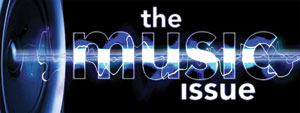
In gay dance clubs, the bartender is crucial, and the doorman keeps the peace, but the hero of the night is the DJ. The DJ works not just as the person bringing the tunes, but also as ship’s captain, leading the dance floor into an open sea of remixes and creating waves of euphoria through matched beats. Rarely, though, do we hear them open up.
Until now. Seven DJs from across the Dallas scene candidly weigh in on the crowds they play for, the state of Dallas’ party scene and just where is it heading. From dance to country to even outside the gayborhood, queer DJs are setting the tone and making their mark, but now they want to be heard.
— Rich Lopez
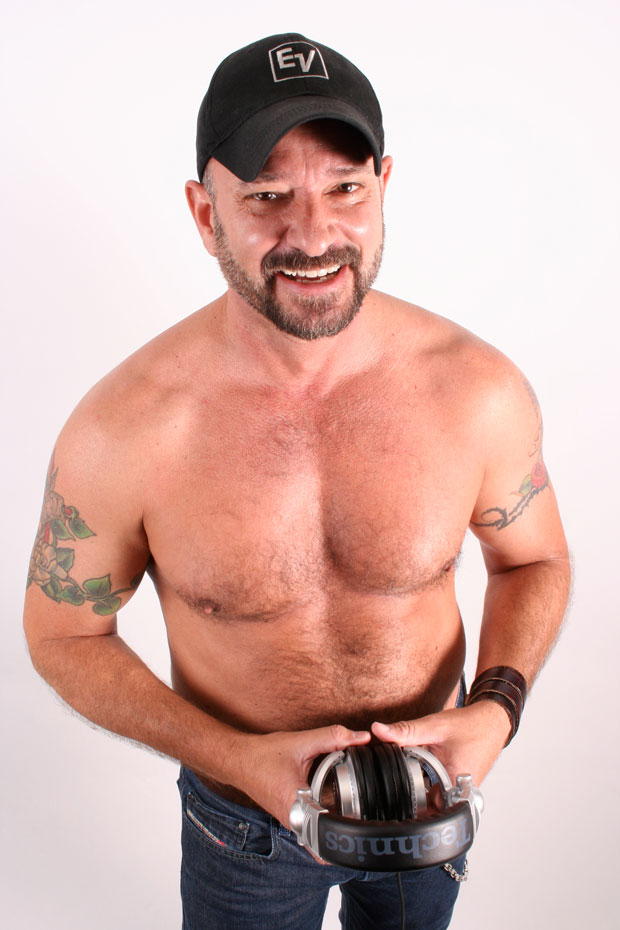
DJ BLAINE SOILEAU | ‘If you want to hear your favorite song, go sit in your car then come back into the club.’ (Arnold Wayne Jones/Dallas Voice)
Dallas Voice: How has the scene evolved?
Alex Guerrero: I’ve been going to Cedar Springs since I was 19 and it hasn’t changed much. The area could explore something more. The music has changed for sure and the lesbian scene embraces trendy genres like dubstep.
Paul Kraft: How we socialize as a community has changed. It’s a real challenge. Younger LGBT members socialize more in non-gay clubs. Clubs should adapt; smart ones are appealing to diverse patrons.
Scottie “Redeye” Canfield: I hear complaints all the time about how DJs can’t play a non-hit. I come from the “trust-the-DJ” era.
Blaine Soileau: I’d like to go more progressive. What I think holds [me] back are the constant requests for Gaga, Britney and Rihanna.
Micah, you are in Los Angeles now. Is the scene different there?
Micah Banes: The L.A. scene lets me play what I want. They are open to anything. I can play a dubstep track followed by disco and the crowd digs it.
How could the scene be better?
Redeye: I wish there was more diversity. [Back in the day], straight people went to gay clubs because the music was better; now, every place is carbon copy and they don’t have the balls to break out.
Soileau: It’s a challenge to break the migration pattern to Cedar Springs.
Banes: Yes! Blaine hit the nail on the head. I think Dallas is hurting on venues. The worst thing is getting the ’mos to experience different things.
Kraft: Much of the scene is held in hands of few — namely, the Dallas Tavern Guild. That doesn’t allow for variety. Caven controls much of the Strip and they [seldom bring in outside DJs], and it’s tougher for smaller indie clubs to finance guest DJs. Until we have more club owners like [those at the Dallas Eagle], willing to be innovative, nothing will change.
What is the Dallas gay club scene doing right?
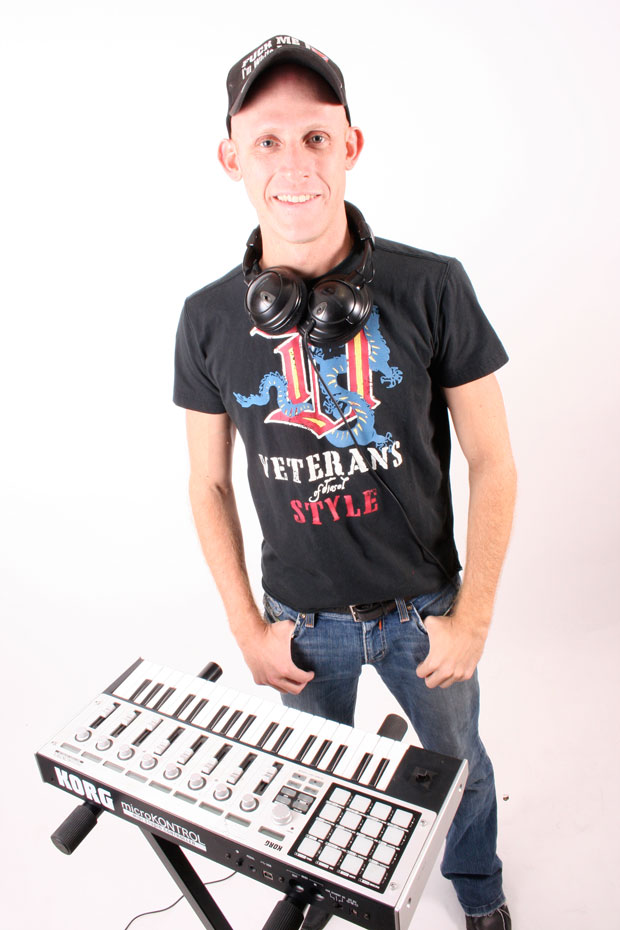
MICAH BANES | ‘I’m excited about where gay music is going. We’re going to see a big change in the next five years.’
Roger Huffman: Our crowd is the same, but we do see more straight people coming in.
Banes: Roger is awesome. He’s got it on lock.
Guerrero: [At Sue Ellen’s], we play to customers and fans. Crappy music doesn’t make us money and the DJs are doing a major part for the night. Great managers help.
How do you keep it fresh?
Guerrero: I know what I do for the lesbian crowd works, but sometimes there is a pressure if they want a different sound. For me, it’s about maintaining focus.
Soileau: I try to change up the music each time I spin locally. I’ll have favorites thrown in but people will definitely hear new and unreleased stuff.
Huffman: We may play some slower country before the faster stuff needs to happen — like the two-steps and the shuffles.
With the Purple Party, MetroBall and the like, how is Dallas as a dance destination?
Redeye: It used to be [great]. I would define the whole scene as kind of stereotypical. It’s the same thing everywhere and there are a lot of people who don’t wanna hear that.
Guerrero: Dallas is lacking in some parts. Station 4 just did the Glow Party and it was cool, but how much better it could be if we had more [of those events]?
Soileau: Bigger events are going by the wayside. Many of the circuit parties from the ’90s have vanished. I don’t think Dallas would support more. We can’t charge a cover because people likely complain.
Erik Thoresen: Yes. Because of one word: Pride.
Banes: Do you think it’s the support or lack of venues for the shrinking of party size?
Soileau: Micah, I think it’s just been done and new things are evolving.
Kraft: Trends change. It was sofa clubs, then bottle clubs, but I’m seeing a trend to dance more.
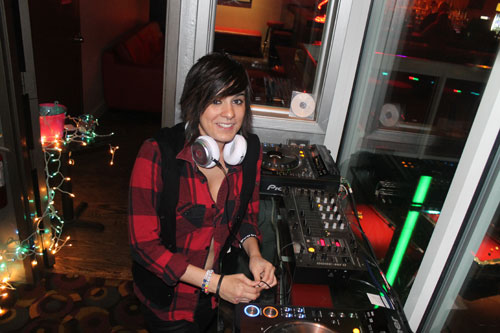
ALEX GUERRERO | ‘Being the only female DJ in town is a blessing. I hope to spread my wings and make the lesbian community proud.’ (Rich Lopez/Dallas Voice)"
Are non-gay clubs surpassing gay ones in innovation with differing offerings like silent discos, guest DJs and live music?
Kraft: I can appreciate out-of-the-box inspiration; incorporating new ideas is always good.
Soileau: Yes, but silent discos were a cute idea, then buh-bye. I would love to see more guest DJs, but try charging a cover to pay for them.
Guerrero: I don’t see a big difference. The clubs I’ve been to are the same, music-wise.
Redeye: You can’t be in this business and be cheap. Clubs are about rep and bringing in someone that’s worth a damn will have more people in spending money at the bar. You have to invest in the bar. Beauty Bar has brought in cutting edge DJs from outside for $1,000.
As DJs, do you think live music options are good or bad for the scene?
Soileau: I’m not sure about more live music.
Kraft: As a dance DJ, the last thing I want is to build up energy to stop for a live act. Sue Ellen’s has done a great job with live music, though.
Huffman: I wish we had more options. A live band came in on our anniversary and we had requests for live bands but nothing became of it.
Banes: The Round-Up would be great for live music.
Soileau: But I don’t see a gay crowd packing a live venue.
Why is that?
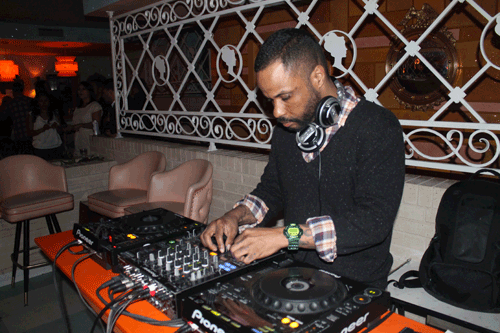
DJ REDEYE | ‘I wish I could play in the community, but play cool stuff. I couldn’t get away with it, so I’ve always been at clubs that were on the fringe.’
Banes: There are not a lot of live acts that can pull in 300 homos to a club.
Soileau: That all would be nice but most of the gay crowd isn’t in-the-know. Back in the ’80s, I would have answered differently. People were thirsty for new stuff.
Guerrero: I know our customers enjoy the bands. There is nothing wrong with more music. What’s wrong with finding gay bands? I’m not a big fan of live music, but seeing them at our club, there is major talent out there.
What has been the best thing to happen to the Dallas club scene? The worst?
Soileau: We haven’t dissolved and faded away. The worst is how the Internet has taken a big bite out of club life.
Banes: Like Blaine said, the Cedar Springs migrations hurt, but the passion is still there.
Huffman: A good thing was the no-smoking ordinance — it made the atmosphere so much better. The worst has been the clubs that have closed.
Redeye: There’s always room for it to get better, but you need a catalyst, a vanguard. Try something out once a month, do something different. Baby steps.
Guerrero: For me, the worst is the drama. It puts people at high risk. Don’t bring the drama out!
Have Scruff, Grindr and social networks affected clubs?
Kraft: You can now order men like pizza. We don’t know how to talk to each other. I think people are getting over that and have more desire to get out.
Soileau: Absolutely. That’s why clubs are promoting alongside these apps.
Thoresen: What hasn’t changed is that people still go clubbing to party and get down.
As DJs on Cedar Springs, how do you respond to that migration?
Guerrero: Working on the block, I’m very lucky, but I know there could be more venues. We work hard to have a presence. I can’t imagine how it would feel if I didn’t get as much visibility.
Thoresen: It’s tough because I’ve been doing solid while other clubs have been up and down.
Huffman: I do like that the clubs are in one location. I think in part, that’s good for us.
Redeye: There is a market for it and I wish I could play in the community, but play cool stuff. I couldn’t get away with it, so I’ve always been at clubs that were on the fringe.
Where do you see the gay club scene heading?
Redeye: Gay clubs feel more segregated than ever. Maybe people think we’re progressing, but we’re really going backwards.
Soileau: It’ll always be in a transitional state. But they’ll be around.
Kraft: It could use more diversity and outside influences. Dallas isn’t known for being versatile. Having been a promoter, I will tell you: It was suicide to deviate. The guys here want what they want. It’s tough from a balancing standpoint.
So what’s your overall perspective on the state of the Dallas gay club dance scene?
Huffman: It’s good. As long as people still are coming out to have fun, it’ll continue.
Soileau: I do think we are trailing straight clubs [in terms of innovation], but it’s a cycle.
Kraft: It could be more current, innovative. The Cavens, the Okons, the Guild still have a hold and work very much in the old way. The Eagle has adapted and moved forward. Until we have more club owners determined to do that, the scene could stagnate.
Redeye: A lot has to do with the business of it. The DJ is there to educate, but if you think of clubs as a school, it’s like the audience gets to check out one book and everyone’s gotta share it.
What do you say to haters who say Dallas has no appreciation for music diversity?
Soileau: You have all these people that are living in a time warp with their relentless requests. If you want to hear your favorite song, go sit in your car then come back into the club.
Final thoughts?
Redeye: I’m not dissing mainstream, but it’s sad when a whole market is ignored. It’s like feeling ostracized in my own community for listening to something different. It doesn’t feel representative.
Guerrero: I feel honored to be in the biggest gay scene; being the only female is a blessing. I hope to spread my wings and make the lesbian community proud.
Banes: I’m excited about where gay music is going. We’re going to see a big change in the next five years.
Kraft: At the Eagle, you can see everybody having a great time together. That‘s the future. Separately things are weak, but draw a number of groups together and you see the strength.
Soileau: Just keep supporting your local clubs because when they are gone you will miss them.
Huffman: I agree with Blaine. The support is important.
Thanks, all. Now keep the party going.
…………………………
Who’s who on the panel
This article appeared in the Dallas Voice print edition February 3, 2012.



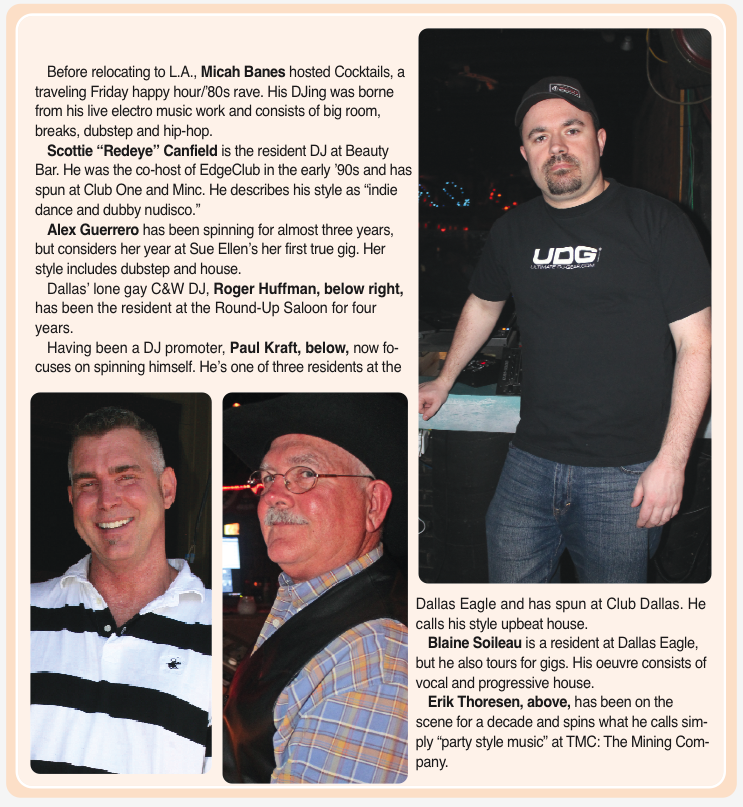











Where is Ronnie Bruno? He is an out DJ who has been spinning in gay clubs for over 25 years. He was also the winner of last years Readers Voice Award for Best DJ, and yet no mention of him in the above article. Who ever was in charge of this article obviously did no research and must know very little about music, specifically the out DJs in our community. Leave it up to the Dallas Voice to forego one of the most important names in Dallas DJ history.
Gay clubs were once known for playing the best music, now they play the worst. When I go to mixed or straighter clubs (which isn’t very often, I’m in my late 30’s), I’m amazed at how much better the DJ’s are. As one of the DJ’s said, gays now want stuff they hear on the radio. I remember clubbing when I was younger and you heard stuff in the gay bars that you heard nowhere else.
The music truly has changed in the club! I can remember when I was young and sneaking in Gay Club. I always heard music I never had heard before. I mean great house music. Not anymore. I dont really go out anymore. I can get better music on my computer at home. And I hate that, because I like to dance. We need to come up to time though.
Thanks for the great article and thank you for including me in it!
Ronnie Bruno would have been a great addiction, like Michael said. He used to DJ with RedEye back in the hay days of Club ONE. But you can’t hate on The Voice for not including every single DJ. There are tons of great DJs around.
I’m very glad that the Voice is able to do articles like this and help push the scene forward.
Great article. And I agree with some of the DJs about the Dallas Dance club scene needing to be more versatile. Back in the 70’s, 80’s and 90’s it seemed like gay clubs were more progressive regarding the music and showcasing the live acts that recorded that music. Now in the 2000’s the music in the gay and straight dance clubs is still progressive and current, however the live acts seem to all be disappearing. And I’m not referring to all the “Melissa Etheridgr-sounding” Lesbian bands at Sue Ellen’s because those bands are a completely different music genre from Club Dance Music. Showcasing dance music from the past few decades IS NOT living in a time warp (as 1 DJ stated) if if is presented the right way on certain nights, Disco Night parties, etc., Station 4 has done their Studio S4 Disco Party about once a year with some nice success, because it is an EVENT!!! But TMC and Roundup have burned Teash Disco out because they have become extremely repetitive with the Classic Dance and Disco
and it has worn itself out. Disco Nights are great but some local DJs need a refresher course on EXPANDING their playlist of Club Classics beyond the usual Abba, and “Funkytown” club tracks. In other cities like New York, L.A. and San Franciso, the club DJs have been mixing “current” AND “classic” club music TOGETHER on the same nights for years now, the gay and straight crowds in those cities love it and it works!!! This us what PROGRESSION and VERSATILITY is all about and Dallas needs to take more example of this format as well. Yes, we are now in an age where club business is having to compete with modern technology regarding the music and meeting people. If you wanna get people away from their computers and back in the clubs and keeping their
iPhones in their pockets,, you need to keep it FRESH, whether you’re the DJ or the club owner.
Thanks for having me in the discussion. One thing i want to clarify though that i think might get taken the wrong way. I was asked about it costing a bunch of money to fly in guest djs. When i was talking about BB spending $1,000 on a guest, i was trying to say you dont have to spend $20,000 on a guest dj to get quality new stuff in your club from NYC or wherever.It seems we all agree on one thing though…the scene needs to branch out and get some variety up in it. Peace!!!
Go the the Eagle Bar..That is one of the Best places to here good music and not top 40.. And you might get lucky too.party on
Great article. Don’t agree that Alex Guerrero is the ONLY female DJ on the scene though. That quote should have been better thought out and researched.
Indeed, Alex is good but she isn’t the “only”. DJ C.Wade and Gloria DJ Passion are two of Dallas premier spin docs and, of course, my personal favs. Alex, perhaps you were misquoted when you said “only”?
Really! This is so typical of the LGBT community in Dallas, Divided. Yet I am proud to announce that DJ Alex is not the only lesbian DJ in Dallas. We have DJ C Wade (Brick/Joe’s), DJ Passion, and DJ Laid Back.
I agree with Eli! DJ Alex is NOT the only lesbian DJ in Dallas. In addition to the ones Eli named, there is also DJ Lady B Smoove…whom coincidentally, was a featured spotlight in The Voice about a year or two ago. I’m shocked that not only was DJ Alex’s comment allowed to make this article, but that The Voice failed to check facts before any of this was published. Once again, Dallas proves to be a great disappointment to the LGBT community.
Ok, where did you guys go to find female DJ’s? who ever worte this article didn’t take the time to research Lesbian dj’s in the DFW metroplex and further you didn’t go to any BLACk/african american events or clubs. So #1 this article is very bias and the facts are false. I have been DJ’n special events and other LGBT events for about the last 2 years and as Tiffany stated above you even covered me in your paper twice. DJ Alex doesn’t mix, (i don’t either) and she only plays top 40 and some dance music. She only plays hiphop that is heard on the radio and never plays R&B like Beyonce is the only damn R&B aritst in the music industry right now. There is DJ Passion who is an awesome female DJ that has good following in both the LGBT and str8 community clubs. I am trying not to be upset about this article but it is hard, because no REAL research was done. As far as the other DJ’s i go to those clubs too and they stick to the same routine in their playlists. you can damn near pin point what song will be played next. The dance scene has evolved and more of the spots on the strip need to get back to having their Straight nights so you get the crowd back. Cuz i don’t even frequent the strip anymore for the lack of variety in ppl and in music. I would rather go to a straight club any night, becuase i know i can get my dance on. If anyone wants to do a follow up article Lady BSmoove is available and won’t hold back what i have to say.
Peace
The article covers everything from dance to country to lesbian DJs.
Should we bash The Voice for not including Latin DJs? And karaoke DJs? And wedding DJs? And Jewish DJs? Rock DJs? Dallas has them all!!! My point is there’s going to be a cut off with who all can be reached in a given time period.
Trying to push boundaries is hard enough with out DJs bashing each other.
I have to admit, I was a bit shocked when I read the “only lesbian” comment as well, but bashing her, the writer, the Voice and Dallas seems a bit extreme for one incorrect comment, yall.
It’s just a bit irritating when someone writes about “the scene” and seems to have no connection to it or no knowledge of it’s history at all. It’s all good but do a little research it makes for a much better read and is interesting. It would not be so bad once or twice but this is ongoing. Maybe the Voice needs to look into finding a writer that really knows the dance music scene and really has an interest in it.
I’m confident the article’s intent was to focus on our LGBT club/bar/dance “scene”… so, I respectfully disagree with throwing out “Should we bash The Voice for not including Latin DJs? And Karaoke DJs?…” And thank you, Micah, for quickly pointing out there was a missed opportunity for the Voice to include Latin DJs. I enjoyed the article… I thought it was a good mix… and I also thought it was a missed opportunity for the Voice to have challenged themselves and ventured out – not for themselves or to be politically correct *which is kinda what i’m hearing* – but, for the readers of those communities. The “only lesbian dj”??… THAT was a GREAT opportunity for anyone sitting in that circle – i mean, come on… look at the collective talent you all brought to the table!!! – for Alex’s comment and confidence to be respected… while educating, expanding and being respectful of so many Dallas lesbian DJ’s and the rest of the community. Readers were “irritated” and expressed their thoughts… that “irritated” YOU – Micah Banes, one of Dallas’ talented dj’s who helped history the “scene”. No quick wit as a response to your “irritation”… No dismissive reply… just a few words that might help the readers understand what my thoughts are about the article, as well. “Ronnie Bruno would have been a great addiction, like Michael said” Really???
ABSOLUTE RESPECT AND MUTUAL ADMIRATION FOR ALL THE DJ’S HIGHLIGHTED IN THIS ARTICLE… You guys are an important part in helping make so much of the “ugly” world go away… even if it is in increments of 3.. 6… or heaven forbid 12minutes Almighty Mixes! lol.. Great Job, Everyone.
“Is Dallas’ gay dance scene what it once was” …. for that statement alone the author of this article should have taken the time to properly research and offer examples and/or comparisons as to why it would or would not be. Dallas Voice being a LGBT “voice” should know that the dance scene in question goes hand in hand with the LGBT Community. So, to ask the question of is it what it once was or what it could be is an insult to us, the voters, the supporters & the Community living in this “scene”. Also, to procure an answer to this question, asking your readers to take the time to respond & read your publication allowing the Voice to even exist, I would expect you to have enough respect for your readers by providing us with the information collected from the research of this and any topic discussed in the Voice so we can make an informed decision that is important to everyone.